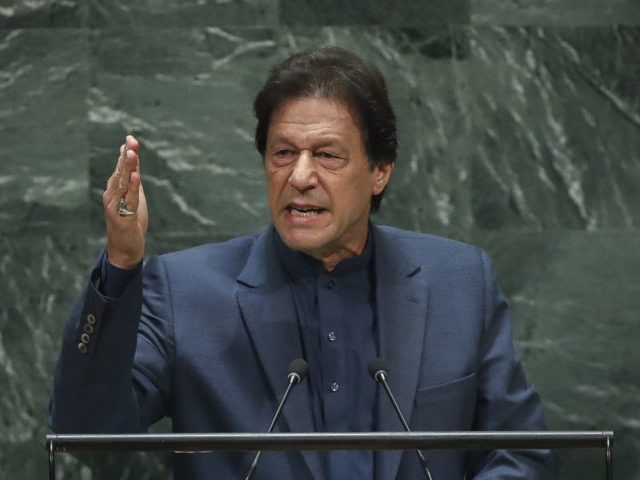Islamist Prime Minister of Pakistan Imran Khan expressed frustration with President Joe Biden on Wednesday night about his lack of communication with the country over neighboring Afghanistan, nonetheless dismissing claims that he was glued to his phone awaiting a call from Biden.
Biden announced in April that he would cancel an agreement made by predecessor Donald Trump to withdraw all American troops from Afghanistan by May 1, 2021. Biden extended the 20-year Afghan War to September 11, 2021. In July, he again recalibrated the withdrawal deadline to August 31, stating the Pentagon was ahead of schedule in the mission to leave.
On Thursday, the Pentagon ordered 3,000 troops back into Afghanistan for a “temporary” mission.
Biden’s inconsistent handling of the withdrawal triggered a rapid military advance on the part of the Taliban, the jihadist organization that ruled the country before the United States invaded in fall 2001. The Trump administration had agreed to withdraw from the country in a deal with the Taliban that required the latter not to attack American forces and to renounce ties to groups like al-Qaeda, the international terrorist organization that prompted the initial U.S. invasion of Afghanistan with its multiple attacks on America on September 11, 2001.
In response to Biden walking away from the deal, Taliban officials have fulfilled their promise to continue their jihad against the legitimate Afghan government and began denying that they ever agreed to some of the provisions in the agreement at all.
Pakistan is a close neighbor of Afghanistan’s and is often accused of harboring jihadist terrorists, including the Taliban. Khan has fervently advocated for a Taliban role in the Afghan government and outraged the world last year by referring fondly to Osama bin Laden, the former head of al-Qaeda during the September 11 attacks, as a “martyr.”
“I keep hearing that President Biden hasn’t called me. It’s his business. It’s not like I am waiting for any phone call,” a disgruntled Khan told reporters Wednesday night, according to the Pakistani newspaper Dawn. Khan implied that Biden was snubbing him to placate India, Pakistan’s top historical rival.
“I think the Americans have decided that India is a strategic partner. Maybe that’s why Pakistan is being treated differently. Pakistan is just considered to be useful only in the context of settling this mess,” Khan said.
Dawn noted that, in contrast to Khan’s dismissive attitude toward communication with Biden, his National Security Adviser Moeed Yusuf had complained in an interview last week that Pakistan was struggling “to understand the signal” that Biden’s silence meant to send it.
“The president of the United States hasn’t spoken to the prime minister of such an important country who the US itself says is make-or-break in some cases, in some ways, in Afghanistan — we struggle to understand the signal, right?” Yusuf told the Financial Times.
In response to the complaint, an anonymous Biden administration official appeared to indicate that Biden was too busy for Khan.
“There are still a number of world leaders President Biden has not been able to speak with personally yet. He looks forward to speaking with Prime Minister Khan when the time is right,” the anonymous person allegedly said.
The treatment of Khan mirrors similar complaints from Ukrainian President Volodymyr Zelensky, who has described himself as “surprised” and “disappointed” with Biden’s disregard for his country’s importance in ties between America and Russia. Ukraine is currently struggling to subdue a civil war in its eastern Donbass region between Russia-backed rebels who have declared themselves sovereign nations. Russia also formally invaded and colonized Ukraine’s Crimea in 2014 and continues to claim the peninsula for itself.
Given Ukraine’s status as the frontline of Russian aggression, Zelensky urged Biden to meet with him in person before meeting with Russian leader Vladimir Putin. Biden refused and instead offered Zelensky a visit to Washington in July. The visit never materialized; the Biden administration recently claimed it would occur by the end of the summer.
Elsewhere in his interview Wednesday, Khan complained that the U.S.-backed government of Afghanistan was “extremely critical” of his administration and accused it of seeking to blame anyone but themselves for the situation in the country.
“Now the Afghan government is extremely critical about Pakistan [and] they think we have some magical powers that we will make the Taliban do whatever we want [them] to do,” Khan said.
They somehow think Pakistan has supernatural powers [and that] we are a superpower plus which has such power that the 60,000 to 70,000 Taliban can take on 300,000 Afghan government troops with aircraft and modern weapons and somehow we have the power to make them (Taliban) win.
He suggested that pleas from Kabul for more American intervention was misguided.
“They want the Americans to intervene again but they’ve been here for 20 years so what will they do now which they didn’t do in 20 years?” he asked.

COMMENTS
Please let us know if you're having issues with commenting.